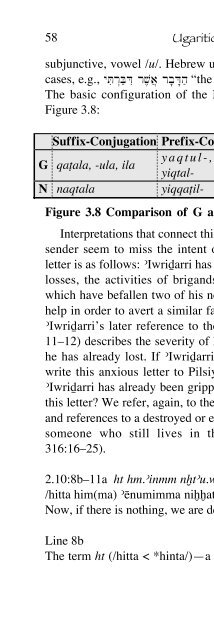A Primer on Ugaritic: Language, Culture, and Literature - enenuru
A Primer on Ugaritic: Language, Culture, and Literature - enenuru
A Primer on Ugaritic: Language, Culture, and Literature - enenuru
Create successful ePaper yourself
Turn your PDF publications into a flip-book with our unique Google optimized e-Paper software.
58<br />
<strong>Ugaritic</strong> <str<strong>on</strong>g>Primer</str<strong>on</strong>g><br />
subjunctive, vowel /u/. Hebrew usually employs a relative in such<br />
cases, e.g., yI;trA;bî;d rRvSa rDb;dAh “the word that I spoke” (Gen. 41:28).<br />
The basic c<strong>on</strong>figurati<strong>on</strong> of the N form of the verb is shown in<br />
Figure 3.8:<br />
Suffix-C<strong>on</strong>jugati<strong>on</strong> Prefix-C<strong>on</strong>jugati<strong>on</strong>s Participle Infinitive<br />
G qatala, -ula, ila<br />
yaqtul-,<br />
yiqtal-<br />
yaqtil-,<br />
qaœtil- qataœl-<br />
N naqtala yiqqatil- *muqtatil- naqtaœl<br />
Figure 3.8 Comparis<strong>on</strong> of G <strong>and</strong> N Verbal Forms<br />
Interpretati<strong>on</strong>s that c<strong>on</strong>nect this term with the defeat of the letter<br />
sender seem to miss the intent of the letter. The c<strong>on</strong>text of this<br />
letter is as follows: }Iwridarri has heard of negative events, military<br />
losses, the activities of brig<strong>and</strong>s, or some other kind of attack,<br />
which have befallen two of his neighbors. He writes to Pilsiya for<br />
help in order to avert a similar fate, not to report his own demise.<br />
}Iwridarri’s later reference to the deathly grip of the gods (lines<br />
11–12) describes the severity of his state; it does not indicate that<br />
he has already lost. If }Iwridarri has already lost the battle, why<br />
write this anxious letter to Pilsiya? And, come to think of it, if<br />
}Iwridarri has already been gripped by Death, how could he write<br />
this letter? We refer, again, to the c<strong>on</strong>temporary Amarna messages<br />
<strong>and</strong> references to a destroyed or empty house, obviously written by<br />
some<strong>on</strong>e who still lives in the house (see EA 102:11–12;<br />
316:16–25).<br />
2.10:8b–11a ht hm.}inmm nh˙t}u.w. l}ak {my.<br />
/hitta him(ma) }eœnumimma nih˙h˙ati}uœ wa la}ak {immiya./<br />
Now, if there is nothing, we are defeated, so send to me.<br />
Line 8b<br />
The term ht (/hitta < *hinta/)—a temporal adverb—focuses <strong>on</strong> the


